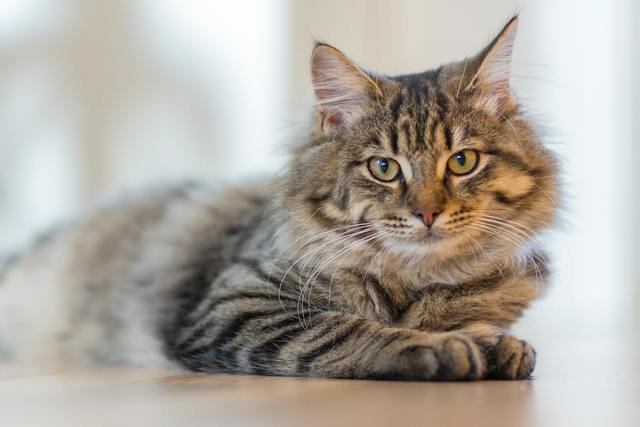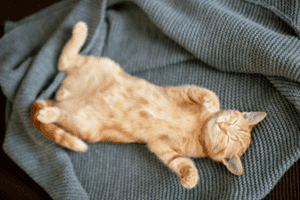Have you ever wondered that When Should I Worry About Cat Sneezing? If your cat has never before exhibited signs of illness and suddenly starts sneezing, it’s best to take him to the veterinarian for a check-up. Sneezing can be a sign of many different illnesses, from minor infections to serious conditions such as cancer.
Sneezing that is accompanied by discharge from the eyes or nose, fever, lethargy, loss of appetite, or other unusual symptoms should also be cause for concern. If your cat has been sneezing for more than a day or two and does not show any other signs of illness, it’s probably nothing to worry about, but you should still keep an eye on him and call the vet if his condition worsens.
Table of Contents
When Should I Worry About Cat Sneezing? Reasons of Cat Sneezing

There are a number of things that can cause cats to sneeze, from allergies to dust to infections. Here are some possible reasons of cats sneezing:
- Allergies: Many cats are allergic to outdoor allergens such as pollen, grass, and weed dust. Indoor allergens such as dust mites and pet dander can also cause sneezing.
- Infections: A number of different infections can cause sneezing in cats, including upper respiratory infections, sinus infections, and even cancer.
- Foreign objects: Cats can easily inhale small particles or objects that can then become trapped in their nasal passages, leading to sneezing.
- Environmental factors: Extreme changes in temperature or humidity can also make cats sneeze.
- Dental Disease: When a cat’s teeth are infected or decaying, the bacteria can spread to the nasal passages and cause sneezing.
- Feline Herpes: This is a common virus that can cause sneezing, eye drainage, and fever in cats. This is generally caused by stress and is not a serious illness.
How to Prevent your cat from Sneezing

- Keeping your cat indoors as much as possible to reduce exposure to allergens.
- Regularly cleaning your cat’s litter box to help reduce the amount of dust and allergens in the home. Removing any sources of indoor allergens, such as pet dander, dust mites, and mold.
- Using a HEPA filter in your HVAC system.
- Administering antihistamines or decongestants if your cat is allergy prone.
- Taking your cat to the vet for regular checkups and vaccinations to help ensure he remains healthy and free of infections
Why is my cat sneezing all the time?
There are a number of possible reasons why a cat might be sneezing, from allergies to infections to environmental factors. If your cat has never exhibited any signs of illness before and is suddenly sneezing all the time, it’s best to take him to the veterinarian for a check-up.
Is sneezing in cats serious?
Sneezing can be a sign of many different illnesses, from minor infections to serious conditions such as cancer. If your cat has been sneezing for more than a day or two and does not show any other signs of illness, it’s probably nothing to worry about, but you should still keep an eye on him and call the vet if his condition worsens.
What can I do to help my cat stop sneezing?

If your cat is sneezing due to allergies, you can try to reduce his exposure to the allergens that are causing the reaction. If he is sneezing due to an infection, antibiotics may be prescribed to clear it up.
If environmental factors are the cause, you may need to make some adjustments to your cat’s environment to make him more comfortable.
Do cat colds go away on their own?
This is a question that many cat owners may ask, as their beloved pet often seems to be sneezing and has a runny nose. In most cases, a cold will go away without any treatment, but there are a few things that you can do to help your cat feel better.
- The first thing that you should do is make sure that your cat is getting plenty of rest. A cold can make your cat tired and sluggish, so make sure that she has a comfortable place to sleep. You may also want to consider increasing her food intake, as she may not be eating as much because she doesn’t feel well.
- You can also help to clear your cat’s nose by using a saline nasal spray. This will help to loosen the mucus and make it easier for your cat to breathe. You can also use a humidifier to increase the humidity in your home, as this can help to loosen the mucus and make it easier for your cat to breathe.
- If your cat is still having trouble breathing, or if she seems to be getting worse, you should take her to see a veterinarian. A cold can sometimes lead to other problems, such as pneumonia, so it’s important to get checked out if you have any concerns.
What about a cat sneezing blood?
This is a serious sign that should not be ignored and warrants an immediate trip to the veterinarian. Blood in a cat’s sneeze can be a sign of many different medical conditions, including nasal cancer.
When in doubt, it’s always best to take your cat to the vet for a check-up.
Read Also: Why do Cats Cry at Night
References:
https://www.health.qld.gov.au/news-events/news/sneezing-101-what-why-how-to-sneeze-correctly-safely





